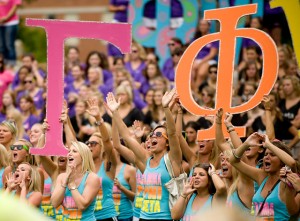
(Image Borrowed From: http://cpc.tamu.edu)
“From the outside looking in you can’t understand it. From the inside looking out you can’t explain it.”
This is an expression I have heard people use many times, and have used a few times myself, to describe the difficulty in understanding what it is like to belong to a fraternity or sorority. I myself am a proud sorority woman. I am proud to say I am a member of something that represents more than myself, but with that membership there comes a challenge. Everyday I am faced with a stereotype that has developed over time in an attempt to define who I am as a person, merely because I made the choice to join a sorority.
Unfortunately, many people only see sororities and fraternities for their stereotypes and although it is difficult to know where these stereotypes started, either through the media or by greeks themselves, both sides have fallen into an endless cycle of the blame game. For years greeks have argued that the media is to blame for the negative stereotypes that have been placed on sororities and fraternities because of its false depictions of greek life and their tendencies to solely focus on the bad. The media on the other hand is relentless in blaming the greek system and exposing any cases of hazing, rape, alcohol abuse, etc. associated with it. In my opinion both are to blame.
The Stereotype of Greek Life
Sororities are commonly associated with a range of stereotypes with some inflicting more damage than others but the most prominent ones include:

(Image Borrowed From: http://totalsororitymove.com/17-real-things-i-heard-sorority-girls-say-this-week/)
-Party Girls/Excessive Drinking
-Get Poor Grades/Dumb
-They Pay For Their Friends
-Sluts
-Hazing
-Rich “Daddy’s Girls”
-Shallow/Materialistic
When it comes to fraternities/fraternity men they are typically stereotyped as:

(Image Borrowed From: http://www.hercampus.com/life/greek-life/freshman-girl-s-guide-frat-parties)
-Party Boys/Excessive Drinking
-Arrogant
-Hazing
-Womanizing
-Preppy
-They Pay For Their Friends
-Get Poor Grades/Dumb
So how much truth is there to these stereotypes? The truth is there will always be those individuals that play into and embody the stereotypes laid out for them, and those few individual’s actions have the power to overshadow the actions and hard-work of those who strive to overcome their stereotype and prove that being greek means much more than people presume.

(Image Borrowed From: http://media-cache-ak0.pinimg.com/originals/fa/cc/1d/ facc1d011d2ef191d23b6036f8359be0.jpg)
According to statistics recently released in regards to the greek community and alcohol abuse, “Only 25% of college students report doing poorly on a project or test as a result of alcohol, but the number skyrockets to 50% along with greek involvement.” Another important statistic found was that “Sorority girls have a higher rate of alcohol abuse: outside the Greek system, 40.9% of college females admit to abusing alcohol, whereas sorority girls drink heavily at a rate of 62.4%”. Also, despite many greek communities efforts across the nation to rid itself from the stereotype of hazing participation, there has been “at least one hazing-induced death per year” with 82% resulting from alcohol abuse. Regretfully, these statistics are clear proof that there is some truth behind the stereotype assigned to this group of individuals.
Positives of Greek Life
Unfortunately, many of greek life’s most positive and praiseworthy aspects are something the majority of people are not familiar with, but despite the ever-changing culture of greek life, the core values and morals on which fraternities and sororities were built on remain the same. All within the greek community strive to live by a similar set of principles that have resulted in a network of students working to make the world a better place. Sisterhood and brotherhood, leadership, philanthropy, and scholarship are among a few of the most important ideals sororities and fraternities were founded upon. These founding principles are what have led many members towards the higher academic achievement, increased student involvement on campus, community service involvement, and development of life-long friendships.

(Image Borrowed From: http://www.tridelta.org/news/03_18_11)
Altogether, according to national statistics, “Fraternity or sorority members form the largest network of volunteers in the U.S.” and are responsible for over 10 million hours of community service each year whether it be working in their community or on a larger scale raising money for major help organizations. Each organization typically has a specific cause for which they devote hours of hard work to raise money and/or raise awareness on the issue. For example, in 2010, Delta Delta Delta Sorority announced their goal to raise $15 million in 5 years for St. Jude Children Research Hospital, it was accomplished in just 3.5.
Also, due to higher academic requirements, students belonging to a greek organization maintain a higher GPA than the overall collegiate GPA and statistically have a 20% higher graduation rate than regular college students. When it comes to involvement on campus, greeks make up over 85% of all student leaders on college campuses, which breaks down the stereotype that they only care about themselves and their respective chapter. Greeks have also been known for their accomplishments outside of their college experience extending into their professional achievements. According to national statistics, “85% of Fortune 500 key executives are fraternity or sorority members.” This goes to show that the values and principles created long ago can still be found in today’s sororities and fraternities despite the changing culture of greek life.
The Media
For many people, the first thought that comes to mind at the mention of greek life is hazing, alcohol, partying, and maybe even rape. But why are the negative associations the ones that come to mind instead of the many positive aspects? The truth is the media is more than willing to report on the rape charges, the alcohol related incidents, and hazing stories, but when it comes to the philanthropy work, community service projects, and academic achievements there is little to be found. In many cases, seeing the stories and headlines in the news are the only time a person has ever been exposed to the idea of greek life.

Image Borrowed from: (http://chronicle.com/blogs/ linguafranca/files/2013/08/greek.jpg)
In 2007, the television show ‘GREEK’ premiered on ABC Family. The show follows the lives of the Zeta Beta Zeta sisters and their fraternity friends at the fictional Cyprus-Rhodes University as they portray the classic sorority and fraternity stereotypes. Everything from cheating on tests, binge-drinking, and casual hookups are common place on the show but what is even more interesting is that the ABC Family channel is traditionally geared towards high school age children. In an article entitled, “‘GREEK’ attracts audience – and criticism” by Matt Jennings, multiple opinions were gathered in regards to the show’s portrayal of greek stereotypes. The thoughts of Mike Schmeckebier, Greek Life Coordinator at DePauw University, interested me the most, “I have never seen the show, but I do think that the age group it targets includes students three, four or five years away from college. I don’t think that [these viewers] are at the developmental level to say, ‘Its just a comedy, its just a sitcom;’ they don’t have a framework or basis of knowledge to know that greek life isn’t like this.”
Outside of the news, the stereotypes of sororities and fraternities are cast in movies and television shows, with very little emphasis on the positive aspects. Many popular movies actually seem to encourage the stereotype, such as, The House Bunny, Animal House, Legally Blonde, American Pie: Beta House, Old School, the list goes on. All of these movies take the common greek life stereotypes and amplify them in way that attempts to make serious issues like alcohol abuse, womanizing, and hazing a subject to laugh at. In response to these movies and shows, many are concerned with the picture of greek life the entertainment industry paints.

(Image Borrowed from: http://uchic.com/sorority-101-the-truth-about-frat-boys/)
“Whether its the catty drama portrayed on the widely watched television series Greek or the debauchery displayed in Animal House, it seems networks and production companies love to represent Greek organizations not for their original purposes of establishing lasting friendships and encouraging a common philanthropy, but towards the very different idea of groups of college students who bond over keg stands and submitting to ridiculous hazing measures,” says Abigail Colby, a college student from Salisbury University. In her blog post, “Greek Life: What’s the real deal?” Abigail outlines her concern for the way in which the media portrays real fraternities and sororities and attempts to set the record straight.
While some understand that these movies and shows do not accurately depict real fraternity and sorority life, many do not. Greeks are just regular students living regular college student life, therefore a movie or show about real greek life would be extremely boring. Real, everyday life is just not interesting enough and that is exactly why the world has entertainment and movies that dramatize all aspects of real life. Although, despite the good intentions of movie and television shows to entertain and not be taken too seriously, they certainly have taken a part in driving the stereotypes and creating new problems not originally foreseen.
Media Influence and Repercussions
It is clear to see that the culture of greek life in the college setting has evolved over the years in many ways, some being good and some being bad. But what is very interesting to think about is how much the exposure of sororities and fraternities in the news and on television actually encourages some of the bad connotations of greek life and influences people to think a certain way towards everything associated with the culture.
For the majority of young adults, upon entering college there has been no exposure to greek life other than that of which they saw through the media. Therefore, after growing up in an society that has fed them nothing but the negative stereotypical idea of greek life, what type of people choose to participate in formal recruitment and possibly become a member? Are these the few students that have been exposed to the real greek culture or the ones that only see greek life for its stereotypes?

(Image Borrowed From: http://alivecampus.com/wp content/uploads/2013/03/frat-parties.jpg)
In a study done by the National Bureau of Economic Research to analyze fraternity membership and their associated drinking behaviors, it was concluded that “students choose to join fraternities in part because of pre-existing preferences towards behaviors that membership facilitates. It would be erroneous, therefore, to assume that these unconditional prevalence differences accurately portray direct effects of fraternities.” These findings show that students who are already pre-disposed to behaviors such as drinking will more than likely be the type of students that participate in formal recruitment. It is not so hard then to believe that other aspects of the stereotypical fraternity or sorority image are also amplified by the medias involvement.
This idea is further discussed in an article to identify the changing trends of the sorority and fraternity experience where the authors conclude that, “the overwhelming media and socialization process in becoming a fraternity or sorority member inundates students with false notions of social drinking norms. This exacerbates the drinking problem in fraternities and sororities” (Perkins, Zimmerman, & Janosik, 2011). For example, having been influenced by media perspectives, a soon to be college student may feel that they would fit into the stereotype of a “sorority girl” or “frat boy”, as they perceive real greek life to be, and join, therefore fulfilling the stereotype. Instances like these show why there are problems in the greek system not necessarily with the fraternity or sorority directly, but with the individuals that behave according to their stereotype. This trend of badly behaved individuals has the potential to snowball and create even more problems unless major adjustments are made.
Proposed Solutions

(Image Borrowed From: http://cdn.pjmedia.com/lifestyle)
Although many are working hard to mend the greek system’s poor reputation and break stereotypes, these negative ideas and associations have been developing for years and cannot be broken by just a few trying members of the community. While some propose to eliminate greek letter organizations on college campuses all together, researchers have found this to be an impractical and unreasonable solution. Greek organizations are capable of doing many great things in their communities, for their institution, as well as for the many charity organizations they support. Therefore, getting rid of organizations with so much potential for success like greek letter organizations is not the best option at hand.
In order to fight many of the problems like drinking and hazing, aside from the strict laws in place to prohibit hazing, five fraternities belonging to the Inter-Fraternity Council have now decided do away with the “pledge period;” this is the time in which a new member participates in the fraternity but is not yet initiated. It is in this time period that most hazing incidents occur; therefore, eliminating the period could prevent these incidents. Aside from changes in procedure many campuses and greek communities have tried to rid themselves of negative connotations by implementing alcohol awareness programs, harsher penalties, and education training for the incoming members but recent studies show even these efforts have little effect on breaking the stereotypes. “…the efforts to reduce hazardous use of alcohol on college campuses (e.g., campus regulations and educational programs, legislation) seem to have had little effect on members of social fraternities and sororities.” Despite the lack of change inspired by these regulations and programs it is a step in the right direction.

(Image Borrowed From: http://www.postandcourier.com/article /20130121/PC16/130129861)
An important part of eliminating their stereotype is showing that those in the greek community are working hard to replace the bad stigmas of greek life with more positive examples of what greeks are doing to improve. In order to break the stereotypes it is important to show society that there is more to sororities and fraternities than what they see on television. It is a slow and difficult solution but this stereotype has been developing for years and therefore is extremely tough to break down, but educating those in society on the truths and positive aspects of greek life is a good place to start.
In his paper on fraternity membership and drinking behavior, Jeffrey DeSimone states, “A return to the founding principles should be an important focus for all fraternal organizations in the future, not only to bolster a declining public reputation, but also to gain perspective on the originating purpose of fraternity/sorority life.” In order for sororities and fraternities to reclaim a more favorable reputation involving their commitment to service, scholarship, leadership etc. members must take the initiative to get back to the fundamental values many of the organizations were founded upon.

(Image Borrowed From: http: //www.themaneater.com/photos/20 10/8/24/1375787/)
Those in the greek system are more widely criticized for their actions than their non-members counterparts because they have pledged to uphold higher standards and values. I believe many members often forget that their actions not only reflect upon them as an individual but also upon their chapter and their organization as a whole. Joining a sorority or fraternity means being a part of something bigger than yourself. Therefore, greeks must cease to embody their stereotypes and start proving to society that being a member of a sorority or fraternity goes beyond what is shown on the television.
Print Works Cited
Perkins, Amy B., J. Daniel Zimmerman, and Steven M. Janosik. “Changing trends in the undergraduate fraternity/sorority experience: An evaluative and analytical literature review.” Oracle: The Research Journal of the Association of Fraternity/Sorority Advisors 6.1 (2011): 57-73.
